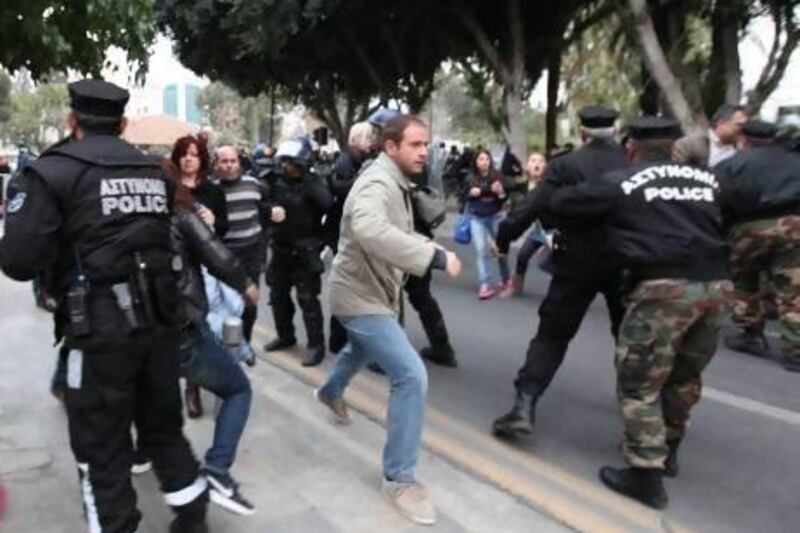NICOSIA // The Cyprus government last night presented a raft of new laws to avert economic collapse, including measures to raise funds for an international bailout, restructuring of the banking system and imposition of controls on the withdrawal and movement of capital.
The cabinet forwarded the bills to parliament amid mounting pressure as the European Central Bank set a Monday deadline for Cyprus to come up with a plan to to raise €5.8 billion (Dh27.5bn) in return for a €10bn bailout or be cut off from emergency funding to the island's crippled banks.
An earlier plan to raise the sum through a levy on bank deposits was rejected by parliament on Tuesday.
The governor of the Cyprus central bank Panicos Demetriades yesterday urged speedy approval of a bank restructuring law that was reportedly aimed at tackling bad loans at Cyprus Popular Bank, or Laiki, the country's second-largest lender.
The government said earlier yesterday that leaders of all the parties had agreed to create a "solidarity fund" which would bundle state assets as the basis for an emergency bond issue. Cypriot officials said the new plan could include nationalising the pension funds of semi-state companies and issuing an emergency bond linked to future national gas revenues.
It would also involve restructuring Cyprus's troubled banks, and taking up an offer of help from the island's wealthy Orthodox church.
Further funds could be raised through privatisation and by increasing the low corporate tax rate.
But the new Cypriot proposals seem to rule out taxing bank deposits, as called for in the original EU bailout deal reached last Saturday.
Parliamentarians on Tuesday rejected the proposal to seize up to 10 per cent of all bank deposits to finance a rescue package, lambasting the levy as "blackmail" and "bank robbery".
But their "heroic negativity", as one local paper put it, upped the stakes in a game of brinkmanship with international lenders.
The prospect of a 6.75 per cent tax on small depositors - most of them Cypriot - caused outrage.
But the government also feared that a proposed 10 per cent tax on larger depositors – many of them Russian – could wreck the offshore financial industry that helps propel the economy.
The Cyprus debacle has stoked geopolitical tensions between the EU and Russia.
Russia's prime minister, Dmitry Medvedev, this week said the bloc had behaved "like a bull in a china shop". He likened EU proposals that would have forced Russian customers to contribute to the rescue of Cypriot banks to Soviet-era confiscations.
The EU's original bailout plan was partly designed to ensure that European taxpayers did not spend billions propping up the allegedly ill-gotten gains of some Russians in Cyprus. Nicosia insists there is no "dirty" Russian money in its banks.
With Cypriot banks in lockdown until next Tuesday, long queues grew at cash dispensers.
Cyprus Popular Bank imposed a €260 daily limit on ATM withdrawals yesterday after customers queued to withdraw money following rumours that the bank was to be closed down.
The ECB is keeping Cypriot banks alive by allowing them to draw on emergency support from the local central bank. The Cypriot government has ordered banks, closed since the weekend, to stay shut until Tuesday to prevent a run on deposits.
In its hour of need, Cyprus has turned to Russia, a close historical ally.
In Moscow, the Cypriot finance minister, Michael Sarris, said he was discussing possible Russian investment in the island's banks and energy resources to reduce its debt burden, as well as an extension to an existing €2.5bn Russian loan.
There had been reports that Cyprus was also seeking a new €5bn loan from Moscow. But Mr Sarris said yesterday there were no plans to borrow more money from Russia as this would only add to the island's debt burden.
A poll by a Cypriot television station said two-thirds of Cypriots would rather pull out of the euro zone and do a deal with Russia.
The EU has no desire to see Cyprus, one of its smaller members, moving closer to the Russian orbit, but at the same time is keen for Moscow to share the island's debt burden.
Nationalising pension funds of semi-public companies could yield between €2bn and €3bn. But issuing bonds linked to untapped gas reserves is problematic because exporting gas is years away.
Senior euro-zone officials acknowledged in a conference call on Wednesday that they were "in a mess" and discussed imposing capital controls to insulate the currency area from a possible collapse of the Cypriot economy, Reuters reported.






